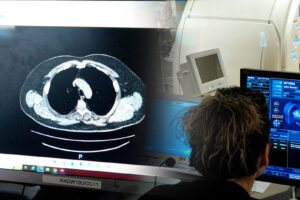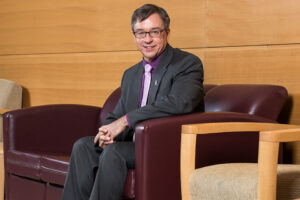A Growing Presence in Baltimore
Published 2/25/22 by the Fischell Institute for Biomedical Devices
The Robert E. Fischell Institute for Biomedical Devices appointed Ryan Smith (B.S.’18, mechanical engineering) as a faculty specialist and Fischell Foundry engineer. Smith also works with UM Ventures as a Medical Device Prototype Engineer, and teaches an Intro to Computer-Aided Design course at the University of Maryland, College Park. Smith provides real-time feedback for clinician-driven medical device ideas and hopes to one day work on clinical models, including those for complex surgical cases. He also designs and fabricates prototypes and engages with clinicians on potential health care solutions.
Smith’s areas of expertise center on additive and subtractive manufacturing – put simply, this involves creating parts using 3D printing and, conversely, creating new parts by removing material from a larger piece of stock. Smith has experience with lathes and milling machines – both manual and CNC – as well as routers, laser cutters, and other manufacturing tools. Smith earned his bachelor’s degree with UMD’s Department of Mechanical Engineering (ENME), and is currently pursuing his master’s degree with the department. Before attending college, Smith owned a business remanufacturing automotive and industrial direct current (DC) devices, such as starters, alternators, motors, and wiring harnesses.
Smith has been splitting his time between the University of Maryland, College Park and University of Maryland, Baltimore (UMB) campuses. In the future, as the Fischell Institute expands its presence at UMB, Baltimore will become Smith’s primary site.
“I have to say, so far the thing I like most about working with UMB researchers is how much knowledge and experience I can tap into,” Smith said. “Coming from a mechanical background without a lot of experience on the medical side of things, having access to so many great minds has really helped me jump right in.”
Smith’s current projects include surgical tools designed to improve common medical procedures. These include a novel design for total knee replacement implants, a bone screw assembly for use in spinal surgery, and a technique to make the process of closing off grafts at the end of a procedure less invasive. Smith added that every project he has worked on to date has focused on ways to improve quality of life for others; this drive to impact others is one of the biggest motivators for his work in engineering.
With regards to future innovations in engineering, Smith conveyed that he is particularly excited about the 3D printing of human organs, peripheral and neural interfaces, and artificial intelligence.
Smith’s love for engineering traces back to his childhood, when he first found a love for building and creating. He recalled how, growing up, he was particularly fascinated with transformers and Lego bricks. Smith said he would constantly take apart his toys and try to combine them with parts from other toys to see what he could create.
Outside of engineering, Smith enjoys playing guitar;he has played for nearly 25 years, during which he enjoyed stints with a few bands. He is also a big admirer of poker and hosts a monthly game with friends. In contrast with his hours in the lab, Smith enjoys going on hikes with his wife, who he recently introduced to camping.
Published February 25, 2022



